#speech pathology
Note
Do you have any examples of shows that handle speech impediment representation well? As someone with a speech impediment, it’s frustrating to constantly see it used only in the contexts of “This person is socially awkward” or “This person has something wrong with them,” etc.
Nothing comes to mind — you're right that there's tons of examples, and most suck. Like, I'll give partial credit to Umbrella Academy for Diego's stutter, Septimus Heap for Sep's selective mutism, and It for Bill's stutter/lisp. They all get the usefulness of speech path, and the way that stress or tiredness can mess you up. But all three also have "I can't be successful unless I talk normatively" crap, and both It and Umbrella Academy briefly have the stutter be the butt of a joke.
Does anyone else have examples that are actually good? Please help.
#speech impediment#disability#speech pathology#it#septimus heap#umbrella academy#the RAGE when lilah mocked diego's stutter in season 3#like - y'all were doing well! 7/10!#and then you just fucking *had to* go there#for the sake of your stupid mean cheap laugh
112 notes
·
View notes
Text

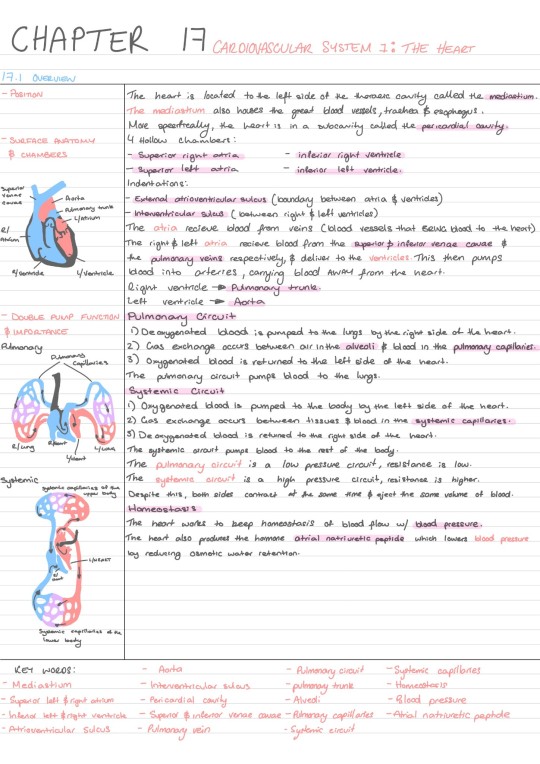
Day 7/100 of Productivity | 03/07/23
Started studying for A&P 2 three weeks early, as A&P 1 was way more difficult than I expected.
Can't wait for Spring Semester (Australia), I tend to perform better academically in the last half of the year than the first...
77 notes
·
View notes
Text
When you're asked for writing elements that you hate, why do you always say that you hate it when the character has a stammer?
#stammering#speech pathology#ao3 writer#writer on tumblr#fan fiction#fan fic writing#fanfic#reading#books#booktok#bookblr#books and reading#bookstagram#ao3 things#archive of our own#ao3
9 notes
·
View notes
Text
Who wants to hear dental hygiene tips from your friendly neighbourhood speechie?
7 notes
·
View notes
Text
Does anyone else have a thing where sometimes when you’re having a bad ptsd episode or another form of breakdown, you struggle to speak in your native language/most commonly used fluent language, but can speak in another language you use fine. Because rn I’m stammering to all hell when I speak in English but I can speak in Spanish more-or-less fine
#cluster b#bpd#cptsd#ptsd#mental breakdown#mental illness#bilingual#multilingual#languages#speech#speech pathology#possibly#anxiety#depression
9 notes
·
View notes
Text
Speech & Language Pathology Stroke Terms
Disorganised list of terms used in slt for stroke- for study/quick reference.
AAC- Alternative augmentative communication.
ABI- Acquired brain injury (anytime after birth).
Agnosia- Inability to process sensory information (in Greek gnosis- "not knowing").
Aphasia- Impairment of language, affecting the production or comprehension of speech and the ability to read or write, depending on the affected area of the brain. (Greek a/without + phásis/speech").
Apraxia- Inability to execute purposeful, previously learned motor tasks, despite physical ability and willingness. (Greek a/without + praxis/action).
Aspiration- Food or fluid accidentally enters the lungs through the windpipe, often as a result of dysphagia.
Bilateral- Involving or affecting both sides, usually referencing both sides of the body.
Capacity- Ability to reason, make decisions and consider choices, express views and receive and understand information (AWI= Adult With Incapacity).
Cerebro-Vascular Accident (CVA)- Stroke.
Cognitive function- Anything involving thinking.
Deep Vein Thrombosis (DVT)- Blood clot forms in a deep vein.
Deglutition- The act of swallowing.
Dementia- Decline of function in the brain causes cognitive problems such as difficulty with memory, understanding and mood.
Dysfluency- Any type of speech which is marked with repetitions,
prolongations and hesitations; an interruption in the flow of speech sounds. Commonly known as stuttering or stammering.
Dysarthria- Collection of motor speech disorders.
Dysphagia- Swallowing difficulties.
Embolism- Blockage of a blood vessel by a blood clot or piece of fatty material or other debris in the blood stream. An embolism is a type of stroke.
Enteral feeding- Feeding through a tube connected to the person's stomach.
FAST test- 'Facial drooping, Arm weakness, Speech problems, Time to call 999'
Fluency- Smoothness with which sounds, syllables, words and phrases are joined together during oral language.
Hemorrhagic stroke- Caused when a blood vessel in the brain bleeds into the brain tissues or the space around the brain.
Hemianopia- Loss of one half of your visual field.
Hemiparesis- Weakness on one side of the body.
Hemiplegia- Complete paralysis on one side of the body.
Hypotonia- Abnormal decrease of muscle tone.
Ischemic stroke/ Infarct- Damage to the brain caused by lack of blood flow, usually from a clot. An area of tissue that is dead because of a loss of blood
supply. This is the most common type of stroke.
Infarction- A sudden loss of a tissue’s blood supply causing the
tissue to die.
Ischemia- Blood flow (and thus oxygen) is restricted or reduced in a part of the body.
Ischemic penumbra- Areas of damaged but still living brain cells arranged in a patchwork pattern around areas of dead brain cells.
Lacunar stroke/infarct- When a small artery deep in the brain becomes blocked, causing a small area of damaged brain tissue.
Left hemisphere- Controls speech, comprehension, arithmetic, and writing.
Muscle tone- The degree of natural tension in a person's muscles. Abnormally high muscle tone can lead to muscle tightness and stiffness (spasticity). Very low muscle tone can cause floppiness (hypotonia).
Muscle tension- When muscles of the body remain semi-contracted for a period of time in the resting state.
Naso-gastric (NG) tube- Medical catheter that's inserted through your nose into your stomach. Used both to deliver substances to your stomach and to draw substances out.
Neglect- Not being aware of one side of the body and/or environment.
Neuron- Nerve cell.
Neuroplasticity- The ability of undamaged parts of the brain to take over the jobs of damaged areas.
Nystagmus- Continuous uncontrolled movement of the eyes.
Paralysis- Partly or entirely unable to move the affected parts of the body.
Percutaneous endoscopic gastrostomy (PEG)- Feeding tube placed through the abdominal wall and into the stomach.
Right hemisphere- Controls creativity, spatial ability, artistic, and musical skills
Stroke- Occurs when something blocks blood supply to part of the brain or when a blood vessel in the brain bursts.
Spasticity- Abnormal increase in muscle tone or stiffness of muscle
Thrombolysis- An early treatment for some types of strokes caused by a blood clot.
Thrombosis- A blood clot that forms in an artery.
Transient Ischaemic Attack (TIA)- sometimes called a “mini-stroke”. Blood flow to the brain is blocked for a short time, usually no more than 5 minutes.
Vertebral artery dissection (VAD)- A tear in the walls of an artery at the back of the neck, blood can then get between the layers of artery walls and can lead to a clot forming, causing a blockage (a stroke).
Visual field loss- The loss of sight in a particular area of visual field.
16 notes
·
View notes
Text
Analyzing An Ataxic Dysarthria Patient's Speech with Computer Vision and Audio Processing
Hey everyone, so as you know I have been doing research on patients like myself who have Ataxic Dysarthria and other neurological speech disorders related to diseases and conditions that affect the brain. I was analyzing this file
with a few programs that I have written.
The findings are very informative and I am excited that I am able to explain this to my Tumblr following as I feel it not only promotes awareness but provides an understanding of what we go through with Ataxic Dysarthria.
Analysis of the audio file with an Intonation Visualizer I built
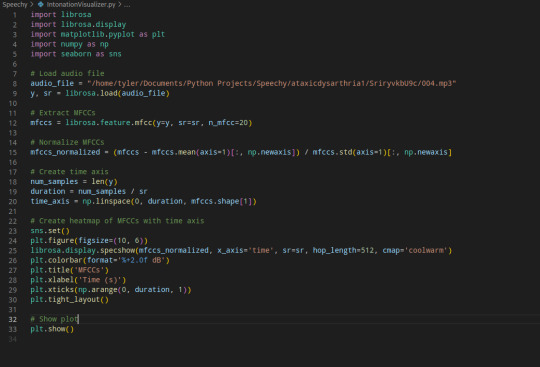
As you can tell this uses a heatmap to visualize loudness and softness of a speaker's voice. I used it to analyze the file and I found some really interesting and telling signs of Ataxic Dysarthria

At 0-1 seconds it is mostly pretty quiet (which is normal because it is harder for patients with AD to start their speaking off. You can notice that around 1-3 seconds it gets louder, and then when she speaks its clearer and louder than the patients voice. However the AD makes the patients speech constantly rise and fall in loudness from around -3 to 0 decibels most of the audio when the patient is speaking. The variation though between 0 and -3 varies quickly though which is a common characteristic in AD
The combination of the constant rising and falling in loudness and intonation as well as problems getting sentences started is one of the things that makes it so hard for people to understand those with Ataxic Dysarthria.
The second method I used is using a line graph (plotted) that gives an example of the rate of speech and elongated syllables of the patient.
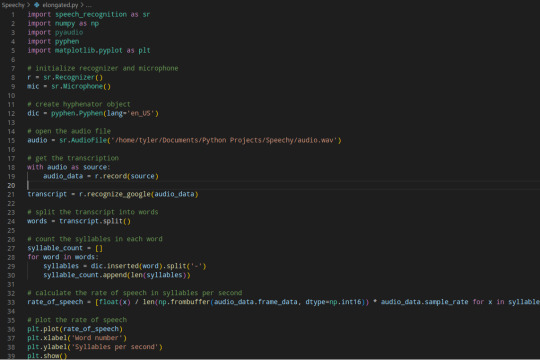
As you can see I primarily used the Google Speech Recognition library to transcribe and count the syllables using Pyphen via "hyphenated" (elongated) words in the speech of the patient. This isn't the most effective method but it worked well for this example and here is the results plotted out using Matplotlib:

As you can see when they started talking at first there was a rise from the softer speech, as the voice of the patient got louder, they were speaking faster (common for those with AD / and HD) my hypothesis (and personal experience) is that this is how we try to get our words out where we can be understood by "forcing" out words resulting in a rise and fall of syllables / rate of speech that we see at the first part. The other spikes typically happen when she speaks but there is another spike at the end which you can see as well when the patient tries to force more words out.
This research already indicates a pretty clear pattern what is going on in the patients speech. As they try to force out words, their speech gets faster and thus gets louder as they try to communicate.
I hope this has been informative for those who don't know much about speech pathology or neurological diseases. I know it's already showing a lot of exciting progress and I am continuing to develop scripts to further research on this subject so maybe we can all understand neurological speech disorders better.
As I said, I will be posting my research and findings as I go. Thank you for following me and keeping up with my posts!
#research#medical research#medical technology#speech pathology#speech disorder#neurology#ataxic dysarthria#ataxia#machine learning#artificial intelligence#ai#computer vision#audio processing#audio engineering#data analysis#data analyst#data science#python 3#python programming#python programmer#python code
38 notes
·
View notes
Text
It’s official official!
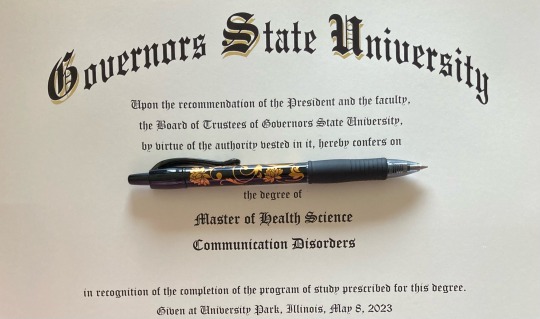
19 notes
·
View notes
Text
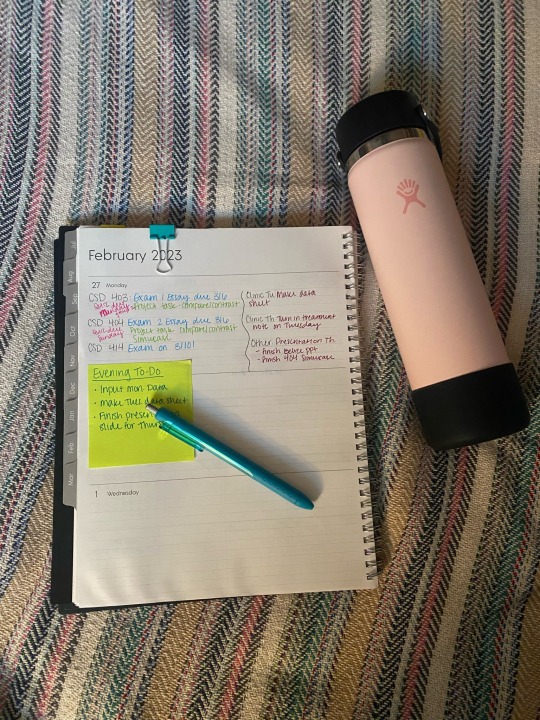

2.27.23
i was not in the mood to walk to the library or a cafe to do work on this rainy and windy day so i picked my bed instead🌧️📝
12 notes
·
View notes
Text
"dyspraxia can also effect your speech"
"ZAT WHYY SLURSHIT?"
2 notes
·
View notes
Text

Discover amazing deals on educational tools, including the Articulation Screener, Organized Dysgraphia Scrap Paper, and Dyslexia Reversal Worksheets. Elevate your teaching and support resources now!
https://www.teacherspayteachers.com/Store/Bearly-Articulating
0 notes
Text

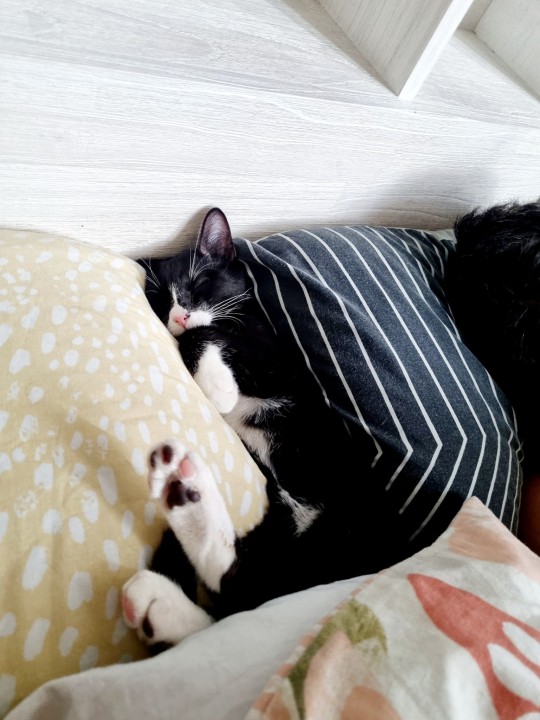
Day 1&2 /100 of Productivity. | 27/06 & 28/06/23
Forgot to post yesterday because I was so busy. But I have gotten a huge number of things done over the past 2 days, it has been amazing! Here are some of the things I have done~!
Detail cleaned my floors.
Washed the dishes.
Detail cleaned my bathroom.
Made a study schedule for A&P 2 (I failed A&P 1)
Done some planning for my wedding.
Bought groceries.
Done a couple loads of laundry.
And that is only a small portion of the list.
I plan to keep doing the days of productivity but may do them sporadically and with a couple days at a time.
#studyblr#student life#university#100 days of productivity#feeling productive#australian#speech student#speech pathology
8 notes
·
View notes
Text
If you are a speech therapist or want to be one LISTEN UP!!! This is how not to trauamtise your kids
Do not be overly condescending. By speech therapist used to talk to be like I didn't know English. Even at 6 years old, that made me hate her
Don't tell them that they aren't practicing. I spent over an hour every single day doing all the exercises, watching my mouth shapes in the mirror, listening to recordings of myself until I cried.
Don't get their parents to record them, and then play the videos in the session and say "Now don't you hear how bad that sounds" or "Can't you see how annoying that is to listen to"
Don't tell their parents to point it out every time that they stammer or pronounce something wrong
Don't say "All the other kids your age are moving so much faster, you're so behind, you really need to work on yourself"
Don't interrupt them. The fact that they are in speech and language beens that they already have difficulties with talking, don't make it harder
Don't tell them that using phrases or sentence structure from their community is wrong. In Dublin + Meath, we say "do be" because it is a direct translation of "Bionn" and we had less time than the rest of the country to learn English if we wanted to keep our scalps on our heads. I was told that it made me sound stupid. My ancestors were colonised, it has nothing to do with my intelligence. This also applies to AAVE. Don't be racist to the kiddos
Don't tell them that they won't get a good job if they don't improve. I wanted to be a teacher and I was told that nobody would want to learn from me if I didn't improve. I've ADHD and I infoblurt a lot. All my friends love it so it's a load of bullshit.
This stuff may seem trivial, but my speech therapist did all those things and I went from a happy, energetic, social little kid who spoke to fast and had a bad stammer, to a shy, kid with no self confidence, a fuck tonne of self hatred and a slightly better stammer. And the effects don't just dissappear after a session. I can't listen to recordings of myself without crying. If someone interrupts me I start spiralling about what I could have done wrong, I can't do phone calls without hurting myself afterwards, I don't share things that I am so excited to talk about because I talk faster when I'm excited and it's been drilled into me that it is the most annoying thing to listen to. I haven't done speech and language in nearly 8 years, but I will still end up in tears thinking about the comments that were made. It destroyed my confidence, and I am still struggling to rebuild it to even 10% of where it was before
3 notes
·
View notes
Note
wait your tags cut out in the post with the baby asking about the light bulb pls keep going it was interesting, also anything else you wanna say as a speech pathologist is cool af too
Hey!
Basically, not totally related to that post, but when you're a baby, you hear all the different human noises around you and your brain goes "oh hey, it's going to be necessary for me to be able to make that sound at some point" and it starts to figure out the motor plans it needs to get your tongue, lips, soft palate etc to make those sounds. After a certain critical period, if your baby brain hasn't heard the sound enough, it goes "eh, we don't need to know how to do this".
So if you think about languages that require you to be able to roll your 'r' sounsd. If you haven't grown up hearing enough people around you rolling their 'r's, you quite likely won't physically be able to do it. Which means you might suck at French.
You can still learn how to understand and speak the language. But your brain doesn't learn motor patterns and languages as easily as an adult as it does when you're a kid.
Babies are sponges.
I'm not a Speech pathologist yet, but only have a few more weeks until my last exams!! Super excited!
Feel free to ask me questions, I get very excited about speech and language these days.
#omg someone actually interracted with me#someone read my tags#future new graduate speech pathologist here#Just got offered a job interview at a place that focuses on dyslexia and literacy which is super awesome#speech pathology#speech development
10 notes
·
View notes
Text
I had this insanely long conversation with a dear friend about how the Batfamily would probably be the most bizarre collection of accents ever. This was the verdict:
Bruce is a Gothamite, but he was raised/primarily around Alfred, with his classic British accent. He'd sound out a lot of his vowels with a bit of a Jersey drawl, but he'd annunciate with the kind of precision you expect from an Englishman. He also probably calls the bathroom the Loo in private and a few other little slang terms. BUT oh, it gets even more confusing as he gets older, because he spent a good chunk of his formative years after basically quitting college being trained by the League... Where the dialect is somewhere between archaic forms of Arabic and some Mandarin (because Ra's is old as dirt and obviously refused to adapt his language habits)? The comics were never very clear, but Arabic was a generally agreed thing. So ultimately? Bruce has this generally soft Gothamite accent with careful English annunciation but some words end up lilting because of League influences. The paparazzi claim it's his "international accent" from traveling all over so much, but in reality? He's Batman. He got that accent from being around Alfred and Ra's when he was young.
Yet then this leaves us to analyze others! I mean, what would Jason's actual accent be? He's a Crime Alley kid at the core, so an insanely aggressive Jersey accent. But then he died and came back, and who raised/trained him in his formative years? Oh yeah, ALSO THE LEAGUE. So now you got this pissed off anti-hero with a voice modulator with an accent that drags at vowels but lilts at random. None of the other criminal kingpins in Crime Alley can pin down if he's actually a local or some upstart from out of town trying to assimilate to the local vernacular.
Dick Grayson is the one with the most Frankenstein accent. Why? He grew up in the Circus, and when his Romani parent was not around to babysit him, it was a diverse mix of individuals with all sorts of accents and verbal ticks. Some lilting, some drawl, a bit of everything. Sometimes he just pronounces one word in a very specific way and it baffles Bruce and Alfred. What's worse? He's just one of those people who picks up accents from friends and family, so he ends up coming home one day after hanging out with Superman pronouncing shit like a Kansas hick out of the blue. Bruce is beside himself.
Duke and Tim are immune. Tim sounds like a Gotham rich kid with good pronunciation but a few nasal vowels and Duke just has a mid-level Jersey accent that any average Gotham kid would have.
Stephanie is the wild card. She's got the Gothamite accent but she's ADHD beyond words. And if you have ADHD, you might understand the feel when you subconsciously start picking up accents for certain words and phrases. As a result, Stephanie will randomly tone-shift into an accent she picked up from a Batfam member. Or her favorite barista at Starbucks. Or Harley Quinn's dramatic Jersey accent that outstrips Jason's.
Cass is stuck in accent/pronunciation hell. She's trying to learn to verbally speak English but everyone around her pronounces shit differently. ASL is great, it's neutral language everyone in the family knows, but when she finally speaks it's a mess of accents that reminds everyone in the family that WOW WE ARE A LANGUAGE SALAD.
Damian just sounds like a rich Arab kid. Perfect English clearly trained into him via a UK-born tutor but plenty of the lilt. He gets subconscious about it privately and tries to lose the accent for the sake of "blending in" to Gotham but he's surrounded by family with non-standard Gotham accents.
And finally: Alfred. He has his British accent but he's surrounded by people who have hybrid accents. When he is extremely upset, he loses a lot of his British posh and sounds a lot like Jason. He blames Jason for cursing wildly and repeatedly in his kitchen over the years for causing this.
#long post#ramble#accents#speech pathology#batman#batfamily#i am sure this has been done but it was a good convo so i decided to share our findings#lol
16 notes
·
View notes
Text
Having mirror speech as a synesthesia type is so weird.
It truly makes me think I should go into being a speech pathologist. I’m already really into linguistics, so I’m sure it’d be really interesting.
I wonder if other speech pathologists have this as well.
#196#196 campfire#rule#196 migration#196archive#synesthesia#synesthete#speech#speech pathology#linguists
4 notes
·
View notes